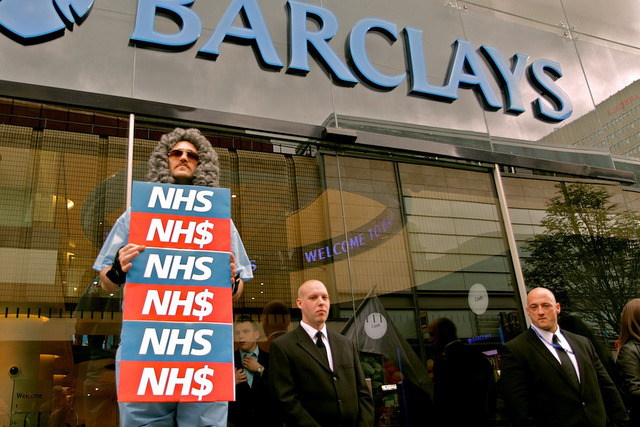The recent Tory fundraiser exposé offers a vital glimpse into the black box of political-corporate ties
Earlier this week, the Bureau of Investigative Journalism released the identities of the attendees of a Conservative Party fundraising dinner, in which an assortment of oligarchs, businessmen and lobbyists paid large amounts of money to dine and drink with members of the Cabinet, including the Prime Minister himself. Here, Stuart Wilks-Heeg argues that a state of affairs which allows such events to take place in secrecy, without any scrutiny of what was or was not discussed, is both absurd and indefensible.
Perhaps the most revealing exchange when David Cameron appeared at the Leveson Inquiry two years ago was when Robert Jay QC read out a text the Prime Minister had received from Rebekah Brooks, then chief Executive of News International. She wrote:
I do understand the issue with The Times. Let’s discuss over country supper soon.
Although a mere 80 characters, these two sentences were worth 1,000 words when read out in the context of an inquiry into the culture, practices and ethics of the British press.
As Ben Fenton noted in The Financial Times six months later, the reference to country supper “crystallised an imagery of the private lives of the rich and powerful. It summoned up a scene of big business and high politics tête-à-tête”.
A little more than two years after Cameron’s grilling at the hands of Robert Jay, the PM was being quizzed in the Commons about a quite different, but equally revealing, evening meal. Kerry McCarthy, Labour MP for Bristol East, asked Cameron at Prime Minister’s Questions:
At the Tory billionaires’ summer ball, the defence secretary was sat with the lobbyist for the government of Bahrain. Can the Prime Minister tell us whether they discussed the fact that Bahrain is still not regarded by the Foreign Office as a human rights country of concern?
Since the question was about lobbying and, indirectly, party funding, the PM deployed his now customary response of sidestepping the issue entirely and instead launching into an assault on Labour’s reliance on trade union funding. Yet, while his own side cheered the stock answer as rowdily as ever, more questions were emerging outside the Commons about a detailed account of who had attended the summer ball in question.
Meanwhile, calls were made for the guest-list for the summer 2014 Conservative Party fundraiser at London’s Hurlingham Club to be published at which Michael Gove, Nicky Morgan, Matthew Hancock and David Gauke, among other ministers, were reported to be hosting tables.
The leaked guest list
Now a carefully timed feature has been published by the Guardian and the Bureau of Investigative Journalism (BIJ). Using similar techniques to those deployed with great effect in its previous investigations into party funding and lobbying, the BIJ’s research centred on 449 names which appeared on a leaked guest list of those attending the summer 2013 Conservative Party fundraiser.
The BIJ established the combined wealth of the attendees (£11 billion+), the sectors of the economy from which they were drawn (dominated by finance, property, retail and PR), and how much each had donated to the Conservatives since 2001, either personally or through companies they control (£22 million, of which £5 million had been given after the Ball).
No bubbly, no tweeting
The BIJ/Guardian investigation revealed much else besides. We know what was served (smoked rainbow trout, pan-fried guinea fowl, rhubarb and elderflower tart) and that, according to one guest, the food “wasn’t memorable”.
We know who sat at which tables and that attendees felt “the tables were too close together”. We know there was a ban on both social media use and champagne – for fear that an overly ostentatious Conservative Party event for the super-wealthy would not make for helpful press coverage during a period of austerity.
We’re not lobbying, we’re networking
Where participants were far less forthcoming was with respect to what they actually talked about. James Henderson, chief executive of Bell Pottinger, a public affairs firm, said: “We do not go there to lobby ministers in any form. We go there to support the party.”
“I participated in no conversation on policy”, said Andrei Borodin, a Russian banker in exile, who sat at a table with Boris Johnson.
These sorts of statements from party donors and attendees at fundraisers follow a familiar script. But it is far from clear where “supporting the party” stops and where “discussing policy” and “lobbying” start. The justification offered by one attendee that networking at such events helps “to make the wheels go round”, underlines just how flimsy such distinctions are in practice.
More importantly, a guest list for a single Conservative Party fundraiser is simply a snapshot of a specific moment of elite interaction. The reason why extensive data collected on the back of a seating plan for dinner is quite so revealing about the nature of power in modern Britain is that it allows us a glimpse into a part of the black box of political-corporate connections that we so rarely get to see otherwise.
For now we see through a glass, darkly
The revelations have been met with the usual, stringent denials that anything that took place was in any way improper and a rejection of demands that the names of attendees at such events should be declared. Yet, in an era when growing transparency has become such a defining feature of democratic politics, defending such secrecy not only damages public confidence, it also defies logic.
It takes a few clicks of a mouse to find out who the UK Prime Minister has met with on government business in any particular month. It takes a few clicks more to identify whether any of these individuals or organisations also donate to the political party he leads. With these forms of transparency already firmly established, the notion that anyone could expect to pay £1,000 to sit at a dinner table with the Prime Minister and for it to remain secret is, quite simply, absurd.
—
This article was originally published on The Conversation and is reposted with the author’s permission. Read the original article here.
This post represents the views of the author and not those of Democratic Audit. Please read our comments policy before posting. The shortened URL for this post is: https://buff.ly/1j3Q4CF
—
 Stuart Wilks-Heeg is Senior Lecturer in Social Policy at the University of Liverpool, and a current Trustee and former Director of Democratic Audit.
Stuart Wilks-Heeg is Senior Lecturer in Social Policy at the University of Liverpool, and a current Trustee and former Director of Democratic Audit.






 Democratic Audit's core funding is provided by the Joseph Rowntree Charitable Trust. Additional funding is provided by the London School of Economics.
Democratic Audit's core funding is provided by the Joseph Rowntree Charitable Trust. Additional funding is provided by the London School of Economics.
Tory fundraiser exposé offers vital glimpse into the black box of political-corporate ties – by @StuartWilksHeeg https://t.co/OD4tpGq548
The recent Tory fundraiser exposé offers a vital glimpse into the black box of political-corporate ties https://t.co/vDNaCOF6Zl
https://t.co/FEU8uBHbVp – All in this together? Only if you’re a billionaire.
The recent Tory fundraiser exposé offers vital glimpse into the black box of political-corporate ties https://t.co/1jqPZVhV2U